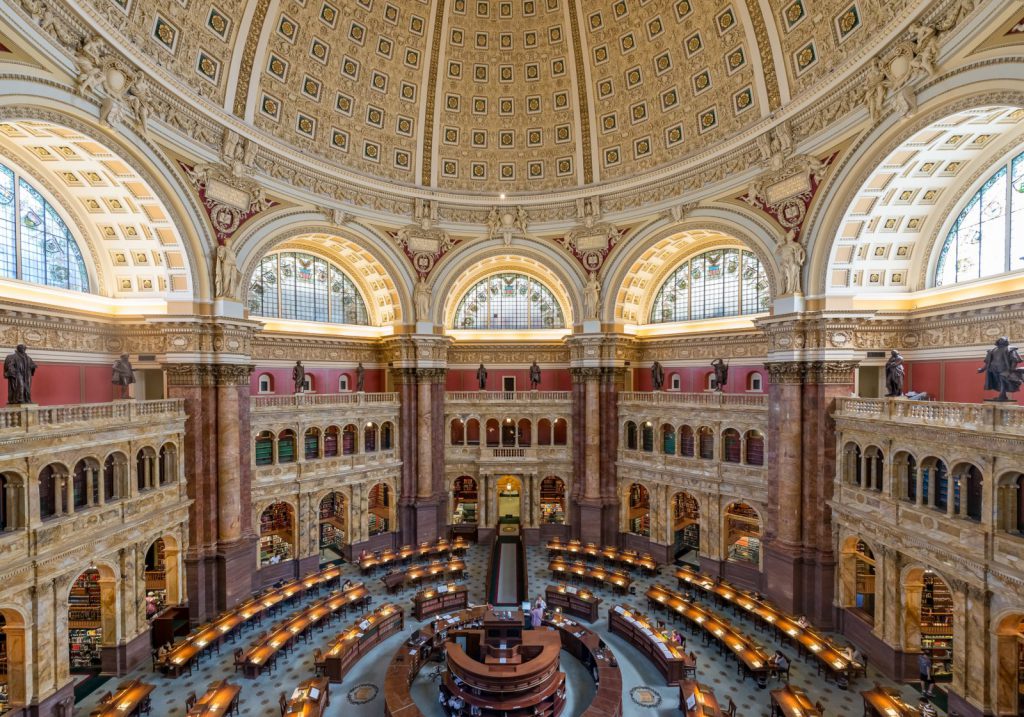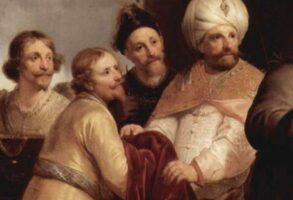
Published November 25, 2018
There have been only 14 Librarians of Congress since the position was created by law in 1802 — and then immediately filled by President Thomas Jefferson with his former campaign manager, the otherwise unmemorable John J. Beckley. Since Beckley, the Library of Congress has been led by a variety of characters who brought to the job various qualifications, some of them rather slim. None of them had a greater impact on the Library or did more to make it an integral part of the nation’s cultural life than James H. Billington, who served as librarian from 1987 until 2015 and who died on November 20 at age 89.
Billington’s service transformed the Library in several ways. After renovating its first and greatest structure, he turned the Jefferson Building into a kind of national exhibit space where he taught America things it may not have known about itself (as in the 1998 exhibit Religion and the Founding of the American Republic) and quietly challenged some of the regnant shibboleths of hyper-secularist scholarship by mounting exhibitions like Rome Reborn: The Vatican Library and Renaissance Culture, which illustrated the profound impact of religious conviction on the Renaissance (and vice-versa). An otherwise-admiring Washington Post obituary repeated the canard that Billington had “struggled” to adjust to the digital age; the truth of the matter is that Jim Billington launched the Library of Congress into the digital age, insisting that its collections be made available online and making it the hub of an international consortium of national libraries whose purpose was to build global solidarity and a global conversation by making knowledge available to anyone, anywhere.
He created the Kluge Center at the Library, so that visiting scholars could work on site with its vast resources, and the Kluge Prize for Lifetime Achievement in the Human Sciences — filling a gap of which Alfred Nobel was evidently unaware. In partnership with First Lady Laura Bush, Billington created the annual National Book Festival. And he didn’t neglect popular culture, creating the Gershwin Prize for Popular Song and the Packard Humanities Institute for preserving audiovisual materials, including classic American films. To make all this possible, he used his formidable skills as a fundraiser to bring hundreds of millions of dollars to Library projects from private sector philanthropy.
Throughout his life, however, Jim Billington was always a teacher. He was much admired by the undergraduates he taught and the graduate students he guided at Harvard and Princeton. When, as Librarian of Congress, he accompanied a CODEL (Congressional Delegation, in swamp-speak) to a Russia whose cultural history he understood as well as anyone in the West, the solons were given a challenging and engaging seminar, not a junket. He did the same for President and Mrs. Reagan prior to and during their historic visit to Moscow in 1988. During the years he led the Woodrow Wilson International Center for Scholars, he displayed a remarkable capacity to enter any conversation among high-powered (and often high-ego) academics and ask the kind of questions that got everyone thinking about the subject matter at hand in a new way. And at the Wilson Center, as during his later work at the Library of Congress, he deftly made sure that theology was welcome in the world of scholarship.
In 1984–1985, when I had the privilege of being a Wilson Center Fellow, the nation’s official memorial to its 28th president was housed in the upper floors of the old Smithsonian Castle, right on the national mall. Designed by that great architectural copycat, James Renwick, the Castle was modeled on a medieval Norman monastery. Its common refectory for Fellows and staff, the cell-like offices we used, and the cramped library all contributed to giving the place a monastic atmosphere — not in the sense of an escape from the world, but as a quiet place where the world could be brought into focus by careful thinking and vibrant conversation, often based on great texts. In that distinctive environment, Jim Billington presided over a scholarly community much as one imagines an abbot like Suger of St.-Denis or Bernard of Clairvaux might have done: by making sure that everyone appreciated the opportunities the venue presented for serious reflection, and by insisting that everyone keep asking the right questions, which were often the unexpected or hard questions.
Which was entirely appropriate, because James Hadley Billington was, above all, a Christian gentleman. There aren’t many of them around anymore and the country is the poorer for it. But he was certainly one. Whether focused on Russia or the history of revolutionary thought, his scholarship was permeated by the conviction that human beings were theotropic, ordered to God by some sort of hard-wiring, and that if the true God were not known and worshipped, false gods surely would be. Jim Billington cast his spiritual lot with the God of the Bible, whom he knew through Christian faith and the Episcopal Church, and that shaped everything else about him: his family life, his thought, and his public service. His was an old-school sort of Anglicanism and much the better for it. For like his fellow-historian Jaroslav Pelikan, Billington understood that, while traditionalism is the dead faith of the living, tradition is the living faith of the dead – and the 21st-century Christian’s point of contact over millennia with some of the greatest of human spirits.
Some may have found his style more aristocratic that has been common in Washington recently since the days of Dean Acheson. But over the thirty years of our friendship, that always struck me as another of Jim Billington’s strengths. There was not a scintilla of snobbery about the man. In him, an aristocracy of the mind coincided with a democracy of the heart, in that he wanted everyone to be able to share the treasures of knowledge and understanding that meant so much to him — especially those who bore responsibility for the common good in these United States.
The day after he died, this Catholic found himself praying Psalm 24 in the Church’s daily order of worship and thinking of Jim Billington:
Who shall climb the mountain of the Lord?
Who shall stand in his holy place?
The man with clean hands and pure heart,
who desires not worthless things,
who has not sworn so as to deceive his neighbor.
He shall receive blessings from the Lord
and reward from the God who saves him.
The capital of a great power, like Washington, D.C., is not usually replete with clean-handed and pure-hearted men, so we should appreciate them when they appear. James H. Billington was such a man. And while I am confident that, at his death, he received blessings from the Lord, I hope that the nation’s capital and its contentious denizens knows what a blessing he was to it, and to them, for so many years.
— George Weigel is the distinguished senior fellow of the Ethics and Public Policy Center.








